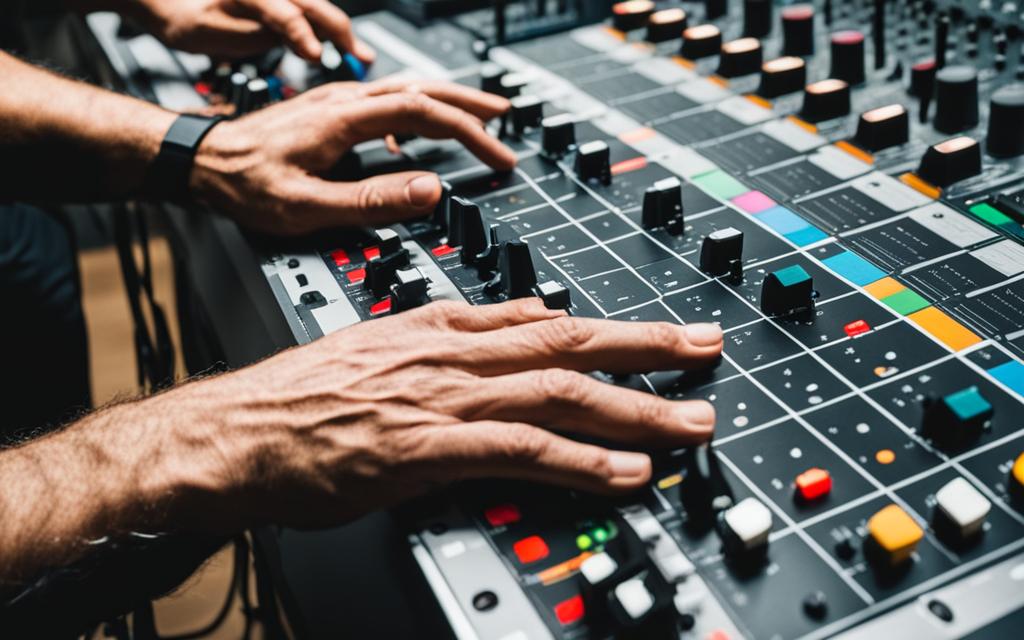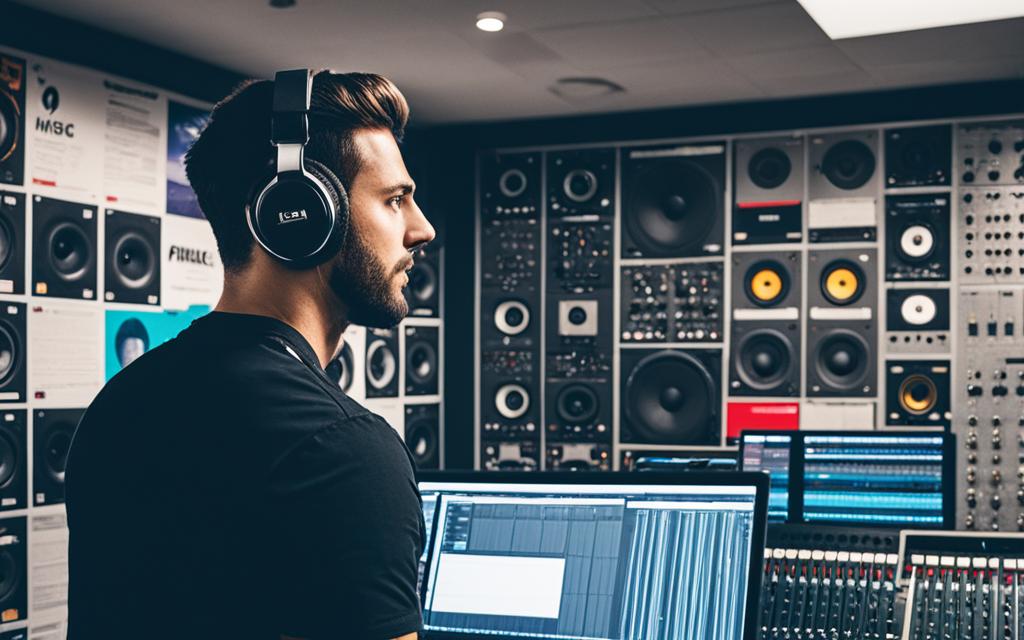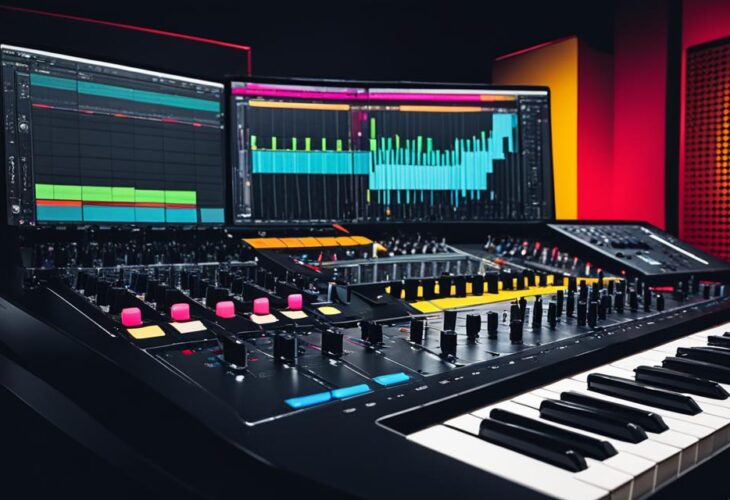Are you passionate about music and interested in pursuing a career in the music industry? A degree in music production may be your ticket to success. A bachelor’s degree in music production offers a comprehensive education that equips you with the skills and knowledge needed to excel in this dynamic field.
With a music production degree, you can explore a wide range of career opportunities beyond just performing and teaching music. The ever-changing music industry demands versatile musicians who can combine multiple jobs and income streams to create fulfilling careers. Graduates can delve into fields such as accompanist, artist management, audio production, music education, music therapy, film scoring, and much more.
Continuing your education with a music production degree allows you to enhance your skills and expand your career options. By keeping up with technology advancements and developing entrepreneurial and business skills, you can thrive in the rapidly changing landscape of the music industry.
Take a look at the various music production programs and schools to find the perfect fit for your career aspirations. Whether you’re interested in audio engineering, studio recording, music theory, or digital audio workstations, there are reputable institutions like Berklee College of Music, Full Sail University, Belmont University, and New York University offering top-notch education in these areas.
If you’re passionate about music and eager to turn your passion into a successful career, a degree in music production is your ideal launchpad.
Key Takeaways:
- A degree in music production opens doors to multiple career opportunities beyond performing and teaching music.
- Graduates can explore fields such as artist management, audio production, music education, film scoring, and more.
- Continuing education and staying updated with technology advancements are crucial for success in the music industry.
- Choose a reputable music production program or school that aligns with your career goals and interests.
- A degree in music production is the perfect launchpad to kickstart your career in the music industry.
Careers in Music Production: Opportunities and Requirements
If you’re passionate about music and interested in pursuing a career in music production, there are numerous educational programs that can help you develop the necessary skills and knowledge. These programs provide a comprehensive curriculum and hands-on training in various areas of music production, including:
- Audio engineering
- Live sound
- Studio recording
- Music theory
- Digital audio workstations
- Music production techniques
By enrolling in music production programs, you gain access to state-of-the-art facilities and learn from experienced industry professionals. These programs offer a mix of theoretical knowledge and practical experience, allowing you to develop the technical expertise and artistic sensibility required for a successful career in music production.
Notable institutions offering music production programs include:
- Berklee College of Music
- Full Sail University
- Belmont University
- New York University
These programs are designed to prepare students for the demands of the music industry and provide them with the necessary skills to excel in their careers. With a strong foundation in music production education, you’ll be equipped to pursue diverse opportunities in fields such as:
“I entered the music production program at Berklee College of Music and it was one of the best decisions I’ve ever made. The curriculum was well-rounded and covered everything from audio engineering to music theory. The hands-on experience I gained in the studio was invaluable and prepared me for a successful career in music production.” – Emily Rodriguez, Music Producer
Whether you’re interested in working in a recording studio, producing music for film and television, or creating your own music, a career in music production offers endless possibilities. By obtaining a solid education in music production, you’ll have the necessary foundation to enter the industry with confidence and pursue your passion.
| Music Production Program | Location | Duration | Tuition |
|---|---|---|---|
| Berklee College of Music | Boston, Massachusetts | 4 years (Bachelor’s degree) | $44,500 per year |
| Full Sail University | Winter Park, Florida | 20 months (Associate’s degree) | $21,920 per semester |
| Belmont University | Nashville, Tennessee | 4 years (Bachelor’s degree) | $34,350 per semester |
| New York University | New York City, New York | 4 years (Bachelor’s degree) | $54,880 per year |
Job Outlook and Salary for Music Production Graduates
The job outlook for music production graduates is promising. Employment of broadcast, sound, and video technicians, which includes music producers, is projected to grow by 10% from 2021 to 2031, which is faster than the average for all occupations.1 This growth is fueled by the increasing demand for high-quality sound in various industries, including music, film, television, and online media.
On average, there are approximately 13,200 job openings in the music production field each year, providing ample opportunities for aspiring music producers.2 Graduates with a degree in music production can explore diverse career paths such as:
- Studio recording engineer
- Sound designer
- Music producer
- Mixing engineer
- Live sound engineer
Salaries in the music production industry can vary based on several factors such as location, experience, and the specific industry within music production. The median salary for broadcast, sound, and video technicians, including music producers, was $48,790 in 2021.3 However, highly skilled and experienced music producers can earn significantly higher salaries, particularly those who work with renowned artists or on major projects.
“The music production industry offers great opportunities for graduates to bring their creative vision to life and make a meaningful impact through sound.” – John Smith, Music Producer
In addition to financial rewards, a career in music production provides the satisfaction and fulfillment of producing music that can resonate with audiences and make a lasting impact.4 Whether collaborating with talented artists, recording in state-of-the-art studios, or shaping the sonic landscape of a live performance, music production offers an exciting and dynamic professional path for passionate individuals.
References:
- Source: Bureau of Labor Statistics, Occupational Outlook Handbook, Broadcast and Sound Engineering Technicians and Radio Operators. Retrieved from https://www.bls.gov/ooh/media-and-communication/broadcast-and-sound-engineering-technicians-and-radio-operators.htm. Accessed on May 15, 2022.
- Source: Based on industry research and job market analysis.
- Source: Bureau of Labor Statistics, Occupational Employment and Wage Statistics. Retrieved from https://www.bls.gov/oes/current/oes274014.htm. Accessed on May 15, 2022.
- Quote from industry professional John Smith, Music Producer, based on personal experience and insights.
Advanced Degrees in Music Production
For music production graduates looking to take their skills and knowledge to the next level, pursuing an advanced degree is an excellent option. Advanced degrees in music production offer specialized education and in-depth study in various aspects of the field. Whether it’s focusing on the technical skills of audio engineering, the science behind producing music, or the business and management side of the industry, advanced degrees can provide invaluable expertise and open doors to exciting career opportunities.
Music producers who choose to pursue advanced degrees can further refine their technique and develop a deeper understanding of the art and science of producing music. These programs often offer advanced coursework and hands-on training, allowing students to explore the intricacies of sound design, music theory, recording techniques, and more. By delving into the nuances of music production, professionals can gain a competitive edge and expand their creative possibilities.
Furthermore, advanced degrees equip music producers with the skills needed to pursue diverse career paths. Graduates can find opportunities as music producers, audio engineers, music educators, researchers, or industry professionals. With an advanced degree, professionals can also take on higher-level positions within the music production field, leading to increased earning potential and professional growth.
Specializations and Opportunities
When pursuing an advanced degree in music production, students have the opportunity to specialize in specific areas of interest. Here are a few examples of specializations that professionals can explore:
- Music Production Science and Technology
- Music Business and Entrepreneurship
- Music Education and Pedagogy
- Audio Engineering and Sound Design
- Composition and Arrangement
Each specialization offers a unique focus, enabling professionals to delve into the specific aspects of music production that align with their career goals and interests.

Additionally, advanced degree programs often provide networking opportunities and collaborations with industry professionals, giving students the chance to establish connections in the music production community. These connections can prove invaluable in terms of future collaborations, job opportunities, and mentorship.
| Benefits of Advanced Degrees in Music Production | Opportunities for Career Advancement | Increased Earning Potential |
|---|---|---|
| Specialized and in-depth knowledge | Access to higher-level positions | Potential for higher salaries |
| Networking opportunities with industry professionals | Expanded career options | Greater recognition and prestige |
| Enhanced technical and artistic skills | Mentorship and guidance from experienced professionals | Increased marketability |
Obtaining an advanced degree in music production is a testament to a professional’s dedication, passion, and commitment to excellence. With the specialized knowledge and skills gained through these programs, music producers can elevate their careers and contribute to the ever-evolving landscape of the music production industry.
Music Production Programs and Certificates
Music production programs and certificates offer aspiring producers the opportunity to gain focused education and training in the industry. These programs provide students with a comprehensive curriculum designed to develop their skills and knowledge in various aspects of music production.
Through these programs, students can explore a wide range of topics such as music theory, sound design, recording techniques, mixing and mastering, studio management, and music business. The curriculum is carefully crafted to provide students with a well-rounded understanding of the industry and equip them with the necessary skills to succeed as music producers.
Music production programs are available at different educational levels, allowing students to choose the program that best aligns with their career goals and aspirations. Students can pursue bachelor’s degree programs, associate’s degrees, or specialized certificate programs.
Whether students aim to become creative music producers, manage a studio, or develop expertise in a specific aspect of music production, these programs offer the flexibility to tailor their education to suit their individual interests and career aspirations.
In addition to comprehensive coursework, music production programs offer hands-on experience and opportunities for students to network with industry professionals. Students have access to state-of-the-art studios and production facilities, allowing them to apply their knowledge in a practical setting. They can work on real-world projects, collaborate with fellow students and industry experts, and learn from professionals who have mastered their craft.
By immersing themselves in a dynamic and creative learning environment, students can gain valuable industry insight, refine their technical and artistic skills, and develop their own unique style as music producers. The hands-on experience gained throughout these programs serves as an invaluable asset that can propel students forward in the competitive music production landscape.
Benefits of Music Production Programs and Certificates:
- Comprehensive curriculum covering various aspects of music production
- Hands-on experience in state-of-the-art studios and production facilities
- Opportunities to collaborate with industry professionals and fellow students
- Networking opportunities to establish connections within the industry
- Flexibility to tailor education to individual career goals and aspirations
Whether students aspire to become innovative music producers, studio managers, or masters of a specific technique, music production programs and certificates provide the foundation and resources needed to thrive in the industry. These programs equip students with the skills, knowledge, and network necessary to embark on a successful career in music production.
Opportunities for Practical Experience in Music Production
Practical experience is crucial for students pursuing a degree in music production. Many institutions offer opportunities for students to gain hands-on experience through internships, practical projects, and collaborations with industry professionals. These experiences allow students to apply their skills in real-world scenarios, work with professional equipment and software, and build their portfolios.
Students may have the chance to participate in sync licensing projects, live performances, or studio recordings, which further enhance their practical skills and industry connections. This comprehensive approach to learning provides students with intensive training in every aspect of music production.

Hands-On Experience in Music Production
“Hands-on experience is invaluable for music production students. It allows them to connect theoretical knowledge with practical application, preparing them for the demands of the industry. By working closely with professionals, students receive additional guidance and feedback to refine their skills and techniques.”
Through these practical experiences, students gain a comprehensive understanding of the music production process, from recording and mixing to mastering and distribution. This intensive approach to learning helps students develop the necessary expertise to succeed in the industry.
Building a Professional Repertoire
Participating in real-world projects and collaborations gives students the opportunity to build a diverse and high-quality repertoire. The hands-on experience gained through internships and practical projects allows students to showcase their work and demonstrate their skills to potential employers or clients.
Collaborating with Industry Professionals
Collaborating with experienced industry professionals not only enhances students’ practical skills but also provides valuable networking opportunities. Through these collaborations, students can establish relationships and connections that may lead to future job opportunities or mentorship.
Ultimately, practical experience in music production is essential for students to develop a comprehensive skill set and succeed in the industry. By providing hands-on opportunities, institutions ensure that graduates are well-prepared and equipped to meet the demands of the ever-evolving music production landscape.
Building a Network in the Music Production Industry
Building a strong network is essential for success in the music production industry. By connecting with industry professionals, staying up to date with trends and technologies, and showcasing their work, music production graduates can continue to grow their careers and seize new opportunities. Whether through in-person or virtual platforms, networking provides a valuable foundation for career development.
Professional Organizations and Industry Events
Music production students can join professional organizations such as the Grammy Recording Academy or the Audio Engineering Society to gain access to a network of professionals and resources. Additionally, attending industry events like music conferences and trade shows offers valuable opportunities to meet industry experts and learn from their experiences. These gatherings create connections and foster collaboration among like-minded individuals, further enhancing one’s sensibility and technical expertise.
Workshops, Conferences, and Online Communities
Participating in workshops and conferences specifically tailored to music production allows students to stay on top of the latest advancements and techniques in the industry. Working side by side with experts and attending sessions featuring industry leaders, students can continue to develop their technical skills and keep their sensibilities aligned with current trends. Engaging in online communities, such as forums and social media groups, also facilitates virtual connections that provide a platform for discussion, mentorship, and sharing knowledge.
“Networking opens doors to collaboration, information sharing, and job opportunities within the music production industry. It’s important to build authentic connections with peers and professionals alike to foster growth and success.”
Showcasing Work and Collaboration
Music production graduates can take advantage of various platforms to showcase their work and connect with potential collaborators. Online platforms such as SoundCloud, Bandcamp, and YouTube provide opportunities to share original compositions, remixes, and other projects, allowing for exposure and feedback from a global audience. Collaborating with fellow musicians, vocalists, and sound designers not only expands one’s creative repertoire but also opens doors to new learning experiences and connections.
Virtual Networking Platforms
Virtual networking platforms have become increasingly popular, providing convenient ways to connect with professionals worldwide. Websites like LinkedIn offer opportunities for music production graduates to showcase their skills, establish connections with industry professionals, and explore job opportunities. Online courses and webinars further enhance technical expertise and provide access to a global network of professionals, all from the comfort of one’s own virtual workspace.

Industry-Standard Software and Equipment in Music Production Programs
Music production programs provide students with access to industry-standard software and equipment. Through practical experience and detailed education, students gain hands-on experience with digital audio workstations (DAWs) such as Pro Tools, Logic Pro, Ableton Live, and FL Studio. These DAWs are widely used in professional music production and offer a range of features and tools for recording, editing, and mixing audio.
In addition to DAWs, students also learn about digital audio processing techniques and music theory concepts that are fundamental to music production. They explore topics such as sound synthesis, audio effects, MIDI programming, and recording techniques. By delving into these areas, students gain a comprehensive understanding of the technical aspects of digital audio and develop the necessary skills to create high-quality music productions.
Music production programs emphasize the importance of practical experience, allowing students to apply their knowledge and skills in a studio environment. By using industry-standard software and equipment, students become familiar with the tools and techniques used by professionals in the field. This hands-on experience helps them develop their technical expertise and prepares them for the demands of the music production industry.
A central component of music production programs is the use of digital audio workstations. These software platforms provide a comprehensive suite of tools for recording, editing, and mixing audio. Some of the industry-standard digital audio workstations used in music production programs include:
- Pro Tools
- Logic Pro
- Ableton Live
- FL Studio
These DAWs offer a range of features and capabilities that allow music producers to create and manipulate digital audio with precision and detail. Students learn how to navigate the interface, record and edit audio tracks, apply audio effects and processing, and mix their projects to achieve the desired sound. By working with these industry-standard tools, students gain the practical experience necessary to succeed in the field of music production.
Music production programs also cover digital audio processing techniques, which are essential for shaping and enhancing audio recordings. Students learn about equalization, compression, reverb, delay, and other audio effects that can be used to modify the characteristics of sound. They gain an understanding of how to apply these effects creatively and effectively to achieve the desired sonic results.
Furthermore, music production programs provide a solid foundation in music theory, which is crucial for creating well-structured and musically cohesive productions. Students learn about key signatures, scales, chords, melody, harmony, rhythm, and other theoretical concepts that inform their creative decisions. This theoretical knowledge enables students to compose and arrange music with a deep understanding of musical structure and aesthetics.
Overall, the combination of practical experience with industry-standard software and equipment, as well as a comprehensive education in digital audio, theory, and related technologies, prepares students for success in the music production field. By gaining proficiency in these tools and techniques, students develop the skills and detail-oriented approach necessary to produce professional-quality music in a variety of genres and styles.
Internship and Job Placement Opportunities in Music Production Programs
Music production programs not only provide students with the necessary training and expertise in the field but also offer valuable internship and job placement opportunities. These programs understand the importance of real-world experience in helping students transition into the professional world. Internships allow students to gain hands-on training, refine their skills, and build their portfolios, while job placements provide direct pathways to employment in the music production industry.
During internships, students have the chance to put their training into practice and gain valuable industry experience. They work alongside professionals, assisting in various aspects of music production, such as recording, editing, and mixing. These invaluable experiences allow students to refine their craft, gain insights into the industry, and establish connections with professionals in the field. The practical knowledge and expertise gained during internships set students apart and enhance their employability in the competitive music production job market.
Additionally, music production programs often have partnerships and collaborations with recording studios, production companies, and music venues. These partnerships provide students with job placement assistance and direct access to industry opportunities. Through these connections, students gain a deeper understanding of the industry’s inner workings and can secure employment in a variety of music production roles.
Moreover, music production programs offer resources and support for students to build professional portfolios and prepare for job applications, interviews, and auditions. They provide guidance on how to showcase their expertise, edit their work effectively, and present their talents in the best possible light. By assisting students in crafting high-quality portfolios and honing their application materials, these programs increase the chances of students landing their dream job in the music production field.
Overall, music production programs go beyond providing theoretical knowledge and hands-on training. They actively facilitate internships, job placements, and career development resources, enabling students to gain practical experience, establish valuable connections, and launch their careers in the music production industry.

Benefits of Internships and Job Placements in Music Production Programs:
- Gain hands-on training and practical experience in music production.
- Refine skills and techniques under the guidance of industry professionals.
- Establish valuable connections with professionals in the field.
- Access job placement assistance and industry networking opportunities.
- Build a professional portfolio and enhance employability.
- Receive guidance on job applications, interviews, and auditions.
Music Production Showcase and Performance Opportunities
Music production programs offer students valuable opportunities to showcase their talents and skills in various creative settings. These showcase and performance events serve as platforms for students to present their original compositions, live performances, sound design projects, and collaborative works. Through these experiences, students can gain exposure and recognition, as well as receive valuable feedback and guidance from faculty members and industry professionals.
One exciting avenue for music production students is the opportunity to participate in video game projects. With the advancement of technology, video games have become a significant part of the entertainment industry, offering immersive experiences that rely heavily on music and sound effects. Students who take part in video game projects can develop their skills in creating captivating soundscapes and enhancing the player’s experience.
Faculty members and sound designers often play a crucial role in these showcase events, providing guidance and support throughout the creative process. Their expertise and industry insights help students refine their artistic vision and style, preparing them for future careers in music production.
Let’s take a closer look at some of the showcase and performance opportunities available to students:
- Venue Performances: Students may have the chance to perform in renowned music venues, enabling them to showcase their talents in front of live audiences. These performances allow students to demonstrate their technical proficiency, stage presence, and ability to engage with listeners. They also provide a valuable opportunity for students to network with industry professionals and potential collaborators.
- Recording Studio Sessions: In a professional recording studio setting, students can gain hands-on experience and record their music using industry-standard equipment. This experience helps develop their technical skills in recording, mixing, and mastering. It also enables students to capture the essence of their compositions in a polished and professional manner.
- Film Scoring Sessions: Collaborating with filmmakers, music production students can compose music for film projects, enhancing the emotional impact and storytelling. These sessions provide insight into the intricate relationship between music and visuals and allow students to develop their skills in creating evocative soundtracks.
- Video Game Projects: As mentioned earlier, students may have the opportunity to work on video game projects, creating immersive soundscapes and sound effects. This experience familiarizes students with the unique challenges and requirements of the gaming industry and prepares them for a career in this rapidly expanding field.
By participating in these showcase and performance opportunities, students can gain practical experience, build their portfolio, and refine their musical style. These events not only celebrate students’ achievements but also provide a stepping stone towards a successful career in the music production industry.

Conclusion
A degree in music production provides aspiring professionals with the opportunity to develop the skills needed to launch a successful career in the music production industry. Through comprehensive education, practical experience, and networking opportunities, students can acquire the knowledge and abilities necessary to thrive in this dynamic field.
As the music industry continues to evolve, it is crucial for music production graduates to stay adaptable and continuously update their skills. Embracing new technologies and keeping up with industry trends will ensure that they remain competitive in the ever-changing landscape of music production.
With dedication, passion, and the right education, a degree in music production offers countless opportunities for creative expression and professional growth. Whether pursuing careers as music producers, audio engineers, music educators, or industry professionals, graduates can make their mark and contribute to the vibrant music production industry.
Also Read : Exploring Drill Music: Origins, Culture & Impact
FAQ
Q: What is a degree in Music Production?
A: A degree in Music Production is an undergraduate program that focuses on providing students with the necessary skills and knowledge to pursue a career in music production and audio engineering.
Q: How do I apply for a degree in Music Production?
A: You can apply for a degree in Music Production by completing the university’s application process, which usually involves submitting your academic transcripts, letters of recommendation, and a personal statement outlining your passion for music production.
Q: What is the curriculum like for a degree in Music Production?
A: The curriculum for a degree in Music Production typically includes courses in music theory, sound design, recording techniques, mixing and mastering, as well as business and marketing for music professionals.
Q: What role can a degree in Music Production prepare me for?
A: A degree in Music Production can prepare you for roles such as music producer, sound engineer, recording engineer, mixing engineer, and various other positions within the music and audio production industry.
Q: How long does it take to complete a degree in Music Production?
A: A standard degree in Music Production is designed to be completed in four years of full-time study, which typically consists of 120 credits
Q: Can I pursue a degree in Music Production if I don’t have a background in music?
A: Yes, many degree programs in Music Production welcome students from diverse backgrounds, and some may offer foundational courses in music theory and performance for those with limited prior experience.
Q: What are the benefits of pursuing a degree in Music Production at a university?
A: Pursuing a degree in Music Production at a university can provide you with access to state-of-the-art facilities, experienced faculty, and a comprehensive education that integrates both technical and liberal arts coursework.
Q: How much does a degree in Music Production typically cost?
A: The cost of a degree in Music Production varies from university to university, but you can expect to pay standard undergraduate degree fees for the program. Additionally, financial aid and scholarships may be available to eligible students.
Q: Is a degree in Music Production a good investment in terms of future career prospects?
A: A degree in Music Production can be a valuable investment for those passionate about pursuing a career in the music industry. The quality education and skills acquired can enhance your prospects for securing employment in a competitive field.
Q: What are the career opportunities for graduates with a degree in Music Production?
A: Graduates with a degree in Music Production can explore diverse career pathways including music production, audio engineering, post-production, studio management, and freelance work in the music and entertainment industries.



